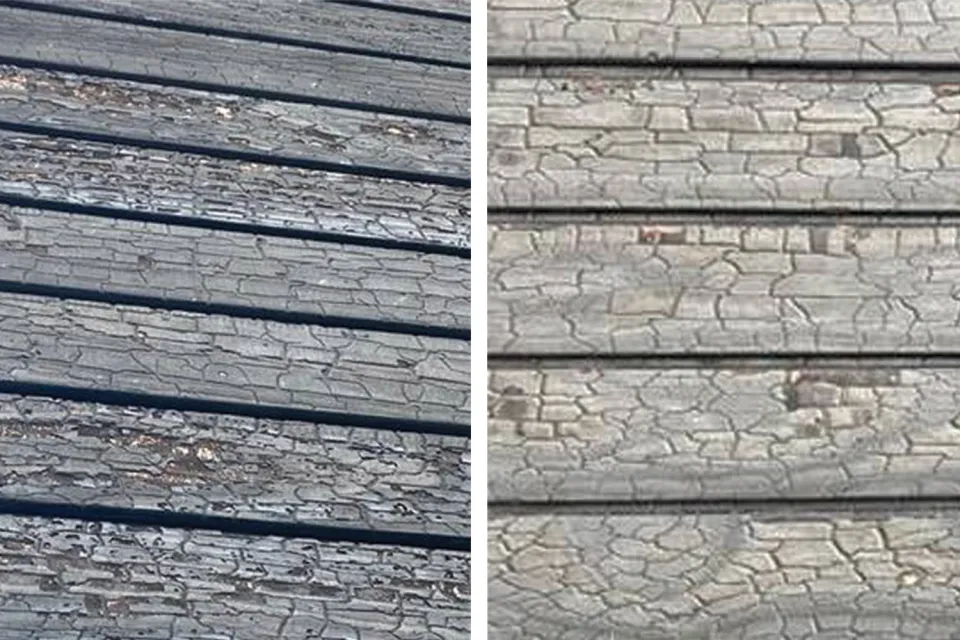-
About
-
Products
- By Timber Product
- Cladding
- Decking
- Screening
- Panelling
- View all
- By Application
- Exterior Cladding / Siding
- Exterior Rain Screen
- Interior Walls & Ceilings
- Soffits
- Screening, Fins & Battens
- Windows, Doors & Joinery
- Posts & Beams
- Accessories
- Coatings
- Fixings
-
Resources
- By Resource Type
- Technical Data Sheets
- Guides & Manuals
- Technical Articles
- Profile Drawings
- View all
- How To
- How to Specify
- How to Install
- How to Maintain
- Projects
- Contact
How Long Does Charred Wood (Shou Sugi Ban) Last?
Surface charred wood (also known as Shou Sugi Ban or Yakisugi) has become an international sensation. However all charred timber is not created equal.
Surface charred wood – an ancient Japanese technique known as Yakisugi or Shou Sugi Ban has become an international sensation – with recent articles in the New York Times taking things to a fever pitch.
However all charred timber is not created equal. In the rush to char wood, it is safe to assume there have been some shortcuts taken, and misunderstandings about charred timber and its lifespan.
Firstly, the choice of timber is critical
Open celled timbers work best, as during the charring process the outermost cellulose burns off, which leaves blackened lignin behind. Depending on the level of char, this can create a very charred alligator type skin on the wood.
The Japanese process has typically used Sugi (cryptomeria japonica) a soft, naturally durable timber native to Japan. For this reason softer. stable naturally durable timbers work best. It is critical that a minimum 1-2mm of char is created in order to create a “wear layer” when the wood is exposed to weather. Many hardwoods do not achieve the depth of char required to provide long lasting durability, beware of charred hardwood.
Abodo’s Vulcan timber is a perfect substrate for charring, a softer naturally durable timber, without the knots found in Japanese Sugi. It also carries Forest Stewardship Council® (FSC®) certification for sustainability.
Secondly, char depth is critical
A heavy char will last longer than a light char, due the way wood weathers when exposed to weathering. When exposed to rain and UV, wood slowly erodes, and it is this sacrificial char layer that erodes, maintaining the black char colour, along with it’s preservative benefits. Abodo uses proprietary oils to create a harder char layer, which in turn reduces flaking of the coating, and improves durability of the char layer.
The charred finish can be expected to flake and wear away slowly over time due to the mechanical action of wind and rain.
This natural weathering process may reveal blackened or raw wood with variations in colour from grey to brown tones or over time, more grey tones. Appreciating the weathering process and seeing the beauty in the aesthetic changes over time is known by Japanese as wabi sabi.
Wabi sabi is defined as “the understanding and appreciation of finding beauty in every aspect of imperfection in nature. To see and enjoy the aesthetic of nature, and know that she is imperfect, impermanent, and incomplete.”
Re-application of black pigmented coating such as Abodo Char Oil - Ebony will mitigate this effect and help to reduce further erosion of the char layer.
Brushing the charred wood often creates a beautiful appearance which can be finished with a natural oil. This finish is more suited to interiors, and will quickly weather once exposed in an exterior environment.
So, how long will a properly charred timber finish last?
It is most certain that it will outlast all black semi-transparent oils and stains. But the truth is no-one really knows. Environmental conditions have a big effect. Exposed sites, such as coastal locations, with abrasive sand and salt air may see faster erosion of the sacrificial char layer with in the first few years. Regular coating of Char Oil will help maintain the surface char, and colour integrity ongoing.
Due to the variability of factors associated in the process and environment there is certain to be mixed results in terms of on-going aesthetic qualities. However the timber itself certainly has a long life span, with Japanese examples of yakisugi treated timber lasting for well over 50 years.
See here for more information.
At Abodo, we’re on a mission for alternatives to what has long been considered normal. Our vision is for all timbers to be safe, sustainable and cared for, like the forests they come from.
Our thermal modification process drives resins from wood and increases the timber’s stability.
This also means our timbers have exceptional weatherability, they’re low maintenance and maintain their durability and beauty for a lifetime.
Watch our video on The Future of Wood to find out more about Abodo eco-timbers.


